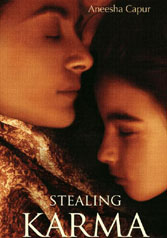Contribute
| In Conversation With Aneesha Capur |
Ranjani Saigal
03/15/2011
Aneesha Capur has an MFA from Warren Wilson College and an MBA from Wharton. She has attended the Vermont Studio Center, The Bread Loaf Writers’ Conference, the Squaw Valley Community of Writers Fiction Program, The Iowa Writers’ Summer Workshop, and the Fine Arts Work Center. Her professional career spans private, non-profit and academic sectors. Aneesha was born in India and spent most of her childhood in Africa. She now lives in San Francisco.
Aneesha's first novel is Stealing Karma which was published by HarperCollins Publishers India in February 2011. Excerpts of Stealing Karma have placed/won awards in the Amazon Breakthrough Novel Award (semi-finalist), Wild River Review, two Glimmer Train Press competitions (finalist) and the Write's Digest Literary Short Story award (honorable mention out of over 18,000 submissions).
Reviews of the book may be found at
Asian Age:
http://www.asianage.com/books/
Indian Express:
http://expressbuzz.com/
The book may be purchased at
http://www.amazon.com/
You started your career doing international development work. Could you tell us about the kind of work you were doing?
I worked in Washington DC for a consulting firm that was awarded USAID and World Bank projects. I was in the Africa division and the largest project I worked on was the first USAID-funded privatization project in post-apartheid South Africa. I also interned at UNDP in Kenya for a program that supported small, sustainable projects and at Oxfam Kenya where we held a multi-day workshop for rural women leaders on laws regarding divorce, property rights and violence against women.
What motivated you to get an MBA from Wharton? What was the greatest value you got from your career as a VP of J.P Morgan Chase?
I moved to the private sector for practical reasons (my parents were still living in Africa and I needed to be in a career that provided economic security—this is something that most of the international students like myself needed to take into account) and because it was intellectually rewarding. I’d been accepted to a PhD program in economics at Columbia when I was in international development but I wanted to get more work experience before entering such a focused graduate program. After working in the private sector, an MBA seemed like the next logical step and it was less theoretical than a PhD in economics. I think the greatest value I got from working in the private sector was the satisfaction in applying problem-solving, analytical skills to improve different business situations (whether it was when I was in management consulting or in an internal strategy group of a corporation).
Congratulations on publishing your first novel. How did you come upon the idea for the book?
There were two inspirations for the book. One was growing up in Nairobi where, at that time, there was such an eclectic mixture of people in an environment that didn’t have the solid political and economic infrastructure of a first world economy and, along with that, there was an absence of a coherent, or even confident, sense of self. Things—politically, economically, socially—were in flux, and there was such a range of ways people lived that I was exposed to, more than I would have been if I’d grown up in the U.S., I think. The other inspiration was my personal interest in the notion of karma, the idea of choice and its limits, the different interpretations of self-determination versus destiny and ideas of individual vs. shared consciousness. But, as I’ve said before in other interviews, these ideas were just a starting point. Once I began working on the book, the story—characters, places and events—took on its own, unique life.
The last big India-Africa-USA based art work - Mississippi Masala captured the imagination of people in the US. What is it about this this combination that seems to touch people deeply?
I think the premise is fascinating. People from one developing nation in one part of the world immigrate (in this case, mainly not by choice) to another developing nation in another part of the world. There’s a clash and a sharing of cultures, ideas, etc. in an environment that already lacks cohesion. There’s also a competition for scarce resources and the existence of a notion that there’s “a better,†“more developed,†more secure†world still out there in the West. The context alone provides inherent conflict and possibility which captures the imagination!
The tale deals with many negative and difficult emotions of a family which is very different from your own. How did you succeed in creating the authenticity of the characters?
Writing fiction works differently from non-fiction. As I mentioned before, you have an inspiration that may come from your own realm of experience or interests, basically something that’s familiar to you, but as the work progresses the characters and the story take on their own lives, form their own integrity, and as long as you give each facet the care it requires in construction, you’re able to evoke authenticity.
We do have many aspiring writers amongst our Lokvani readers. Can you give 2-3 tips for writers wanting to create a quality novel to publish?
In my experience, it’s difficult to write a novel, so my advice would be to do it for the right reasons. Write the story that you feel you must write, the story that you feel you can’t not write. And keep working on it—my advice is more about writing a quality novel versus publishing one. Ultimately there are elements of skill, perseverance and luck that all play into getting a novel published.
Thanks for your time.
Thanks.
You may also access this article through our web-site http://www.lokvani.com/

